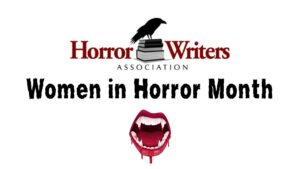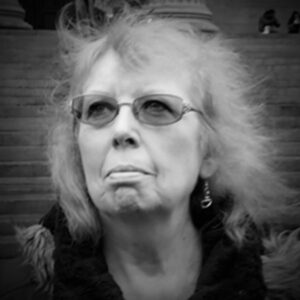
What inspired you to start writing?
I’ve been writing since I could hold a pencil so I think it must be in my genes. My late Mum used to write short stories so that may have been an influencer.
What was it about the horror genre that drew you to it?
I love the delicious scares and the fact that these are scares you know are all right. They’re not going to harm you, even though you daren’t raise your head from under the duvet when you’ve switched the light out. I love the compulsive storytelling, complex characters, and things that lurk in darkened shadowy corners. As a child, I first read the ghost stories of M.R. James and started a lifelong love affair with them. This soon progressed to other horror authors of that era (1960s/1970s) which included Dennis Wheatley (The Devil Rides Out), Ira Levin (Rosemary’s Baby), Arthur Conan Doyle’s The Hound of the Baskervilles to name but three. It was a short hop from there into the Gothic world of Emily and Charlotte Bronte, with Wuthering Heights and Jane Eyre still among my favourite novels of all time. I learned early on that I prefer the ghostly, witchy, supernatural, Gothic, paranormal elements of horror to the more visceral.
Do you make a conscious effort to include female characters and themes in your writing and if so, what do you want to portray?
I tend to have more main female characters than male simply because I tend to dream up stories that work better with a female protagonist. My female characters have usually had to battle against great emotional adversity. The strength they have gained through that is then built on during the cataclysmic events that befall them within the pages of my story. Women generally have great resilience and inner strength and I like to portray that.
What has writing horror taught you about the world and yourself?
I think the main thing I have learned is that what goes on in the real world is usually far more horrific than any fiction. As far as my own personal lessons are concerned, I have learned that writing horror can be a real catharsis. It has helped me through some really rough times and has also helped me put certain challenging experiences of mine into perspective – odd as that might sound. I have also learned that, when it comes right down to it, I just love to tell a story that I like to read and hope others will too.
How have you seen the horror genre change over the years? And how do you think it will continue to evolve?
Styles of writing have changed over the years and certain writers who were popular in my youth are now considered unacceptable owing to language used and changing moralities. Dennis Wheatley is one example. It’s strange to go back and re-read some of the stories from decades back – and cringe at some of the attitudes expressed, but at the time, they were accepted as the norm. I’m sure future generations will feel the same about books published now. I think the role of women in stories has changed. So often in the past, the women would scream at the sight of a mummy, be grabbed and carried off, waggling their legs (in the movies anyway!), and/or have to wait for a man to save them while they bawled their eyes out and nursed a sprained ankle from having tripped over a leaf while running through marshy tundra in stiletto heels and full makeup. Nowadays they grab a gun, cry, ‘Bring it on!’ and save the world.
How do you feel women have been represented thus far in the genre and what hopes do you have for representation in the genre going forward?
There has been a lack of women published in the genre. I think there has been a belief that somehow, and with few exceptions, women can’t write horror yet we only have to look at Mary Shelley to see that has never been true. There is also a feeling among a lot of women that horror isn’t for them and that can be simply because the name, ‘horror’ conjures up images of blood, gore, chainsaws, flying body parts, torture – and the purges of the 1980s. It hasn’t been perceived as ‘feminine’.
Even these days, I get some strange looks when people ask me what I write, and when I say, ‘horror’, they do a visible double-take. They’ve been expecting me to say, ‘children’s’ stories or ‘romance’ – or maybe ‘cozy crime’. Well, I tried writing a romance once, got fed up with the heroine, and left her stranded in a lift with some handsome guy with dark hair and flashing teeth (or was it the other way around?) Anyway, as far as I know, she’s still there – and that was forty years ago!
Happily, I think things are improving. Publishing houses like Flame Tree Press are including increasing numbers of women authors on their roster. The main challenge now, I feel, is from women authors themselves to come forward more. If women don’t write scary stories, they can’t be published. Women frequently bring a different dimension to horror and that serves to expand the reach and range of the genre.
Who are some of your favorite female characters in horror?
In Whatever Happened to Baby Jane?, the title character, played by Bette Davis, is the pure epitome of a horror villain. It’s a fabulous film and I am quite sure Bette Davis derived a great deal of personal delight in putting Joan Crawford through hell!
Annie Wilkes in Stephen King’s Misery is wonderfully deranged – and Kathy Bates portrayed her perfectly, in my opinion.
Merricat in Shirley Jackson’s We Have Always Lived in the Castle is another favourite. I love her strength through adversity. I actually prefer this book to The Haunting of Hill House.
Mrs. Danvers in Daphne du Maurier’s Rebecca is a real Gothic horror masterpiece – in fact, so is the whole book.
Who are some women who write horror you recommend our audience check out?
I have mentioned some of the classics but, of the modern era, try P.D. Cacek, J.H. Moncrieff, Susan Hill, Gaby Triana, Laurel Hightower, Alex Woodroe, Christi Nogle, Somer Canon, V. Castro, Cindy O’Quinn. The list is growing.
What is one piece of advice you would give horror authors today?
Don’t give up – it’s the same advice I would give to any author. Also, don’t rush into self-publishing. It may seem like an easy option when you’ve just received your ninety-ninth rejection, but you will have to source and pay for a really good editor yourself, commission professional-looking cover art, AND do all your own marketing without any backup – unless you find a really reputable publicity agent and, believe me, there are an awful of scammers out there just waiting to part you from your hard-earned cash. Self-publishing is great when done properly but it’s not cheap. Try and cut corners and save money by doing it all yourself and your work will stand out – for all the wrong reasons. And remember, once it’s out there digitally, it’s out there forever. Warts and all.
And to the women who write horror out there who are just getting started, what advice would you give them?
Don’t listen to your Mum who keeps insisting you should give up horror and write cozy crime fiction. Remember – Agatha Christie wrote horror too!
 Following a varied career in sales, advertising, and career guidance, Catherine Cavendish is now the full-time author of over twenty paranormal, ghostly, and Gothic horror novels and novellas. Her novels include: Those Who Dwell in Mordenhyrst Hall, The After-Death of Caroline Rand, Nemesis of the Gods (a trilogy), Dark Observation, In Darkness, Shadows Breathe, The Garden of Bewitchment. The Haunting of Henderson Close, The Devil’s Serenade, The Pendle Curse, and Saving Grace Devine. The Crow Witch and Other Conjurings is a collection of her previously published and brand-new short stories. Her novellas include: The Darkest Veil, Linden Manor, Cold Revenge, Miss Abigail’s Room, The Demons of Cambian Street, Dark Avenging Angel, The Devil Inside Her, and The Second Wife. She lives by the sea in Southport, England with Her Long-suffering husband and a black cat called Serafina who has never forgotten that her species used to be worshipped in ancient Egypt. She sees no reason why that practice should not continue.
Following a varied career in sales, advertising, and career guidance, Catherine Cavendish is now the full-time author of over twenty paranormal, ghostly, and Gothic horror novels and novellas. Her novels include: Those Who Dwell in Mordenhyrst Hall, The After-Death of Caroline Rand, Nemesis of the Gods (a trilogy), Dark Observation, In Darkness, Shadows Breathe, The Garden of Bewitchment. The Haunting of Henderson Close, The Devil’s Serenade, The Pendle Curse, and Saving Grace Devine. The Crow Witch and Other Conjurings is a collection of her previously published and brand-new short stories. Her novellas include: The Darkest Veil, Linden Manor, Cold Revenge, Miss Abigail’s Room, The Demons of Cambian Street, Dark Avenging Angel, The Devil Inside Her, and The Second Wife. She lives by the sea in Southport, England with Her Long-suffering husband and a black cat called Serafina who has never forgotten that her species used to be worshipped in ancient Egypt. She sees no reason why that practice should not continue.
Follow Catherine on her website, Facebook, Twitter (X), TikTok, Bluesky, Instagram and Mastodon.

